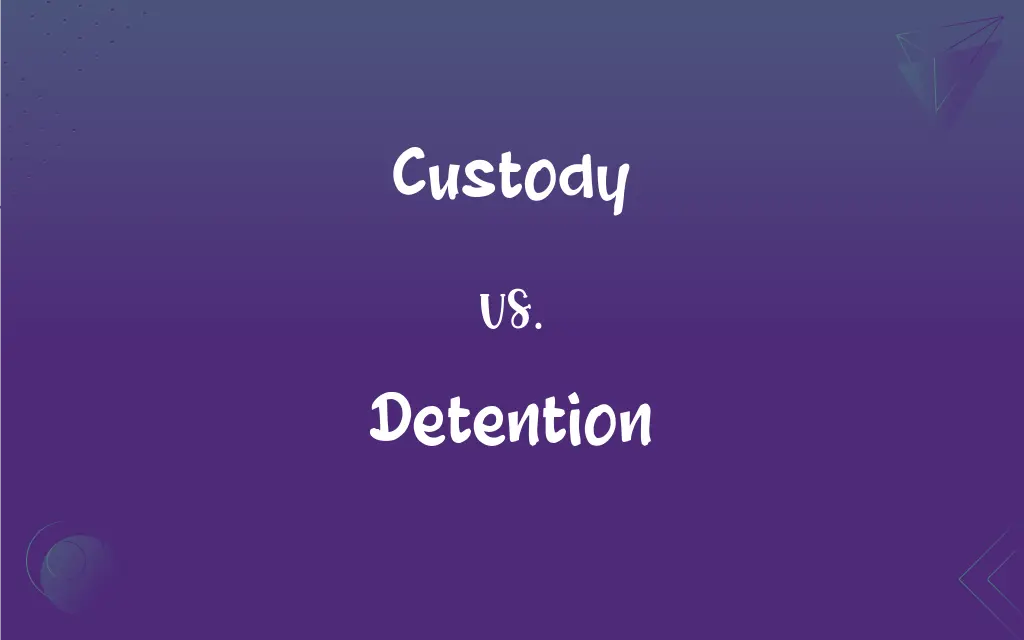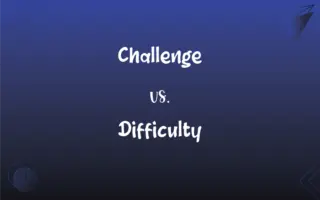Custody vs. Detention: What's the Difference?
Edited by Janet White || By Harlon Moss || Updated on November 30, 2023
Custody refers to the protective care or guardianship of someone, while detention is the act of holding someone in a confined space, often for legal reasons.

Key Differences
Custody typically implies a protective or guardianship role, often in the context of caring for children or managing someone's property or assets. Detention, in contrast, usually refers to the confinement of a person, often in a legal or disciplinary context.
In legal terms, custody can mean holding a person for their protection or as part of a legal process, but it also extends to the guardianship of minors. Whereas, detention is more specifically about the act of keeping someone confined, usually because of a legal accusation or as a disciplinary measure.
Custody can be voluntary, such as in cases where parents have custody of their children, or assigned by a court. Detention, however, is typically involuntary, involving the restriction of someone's freedom, usually by authorities.
The duration of custody can vary greatly, from temporary to long-term, based on legal decisions or personal circumstances. While, detention usually refers to a temporary and often shorter period of confinement.
Custody often involves responsibilities and rights over the person or property under guardianship. Detention focuses more on the act of holding someone and restricts their liberty, often as part of a legal process.
ADVERTISEMENT
Comparison Chart
Primary Meaning
Protective care or guardianship.
Confinement in a restricted space, often for legal reasons.
Context
Legal processes, childcare, guardianship.
Legal accusations, disciplinary measures.
Volition
Can be voluntary or court-assigned.
Typically involuntary.
Duration
Varies from temporary to long-term.
Usually temporary and often for a shorter period.
Focus
Responsibilities and rights over someone/property.
Restriction of freedom, often by authorities.
ADVERTISEMENT
Custody and Detention Definitions
Custody
Legal responsibility for a child.
After the divorce, he shared custody of the children.
Detention
The act of holding someone in custody.
He was in detention awaiting his court hearing.
Custody
Protective care or guardianship of someone.
She was granted custody of her niece.
Detention
Delaying someone for a short period.
There was a brief detention of passengers at the airport.
Custody
Management or control over something or someone.
The artifacts are in the museum's custody.
Detention
Temporary confinement, especially of prisoners.
The activists were held in detention for protesting.
Custody
Detainment by authorities for legal reasons.
The suspect was taken into police custody for questioning.
Detention
Confinement as a disciplinary measure.
The student received detention for being late to class.
Custody
Holding someone as a protective measure.
The witness was in protective custody during the trial.
Detention
A place for confining people, like a detention center.
The refugees were kept in a detention center.
Custody
The control and care of a person or property, especially when granted by a court
An adult who was given custody of the child.
Detention
The act of detaining.
Custody
The state of being detained or held under guard, especially by the police
Took the robbery suspect into custody.
Detention
A period of temporary custody while awaiting trial.
FAQs
Is "detention" the same as "custody"?
"Detention" is similar but usually implies a temporary holding or confinement, often in the context of school punishment or short-term police holding.
What does "custody" mean?
"Custody" refers to the protective care or guardianship of someone or something, often used in legal contexts like child custody or being in police custody.
Is "custody" only related to children?
No, it can also refer to adults, especially in legal contexts like police custody.
What does "detention" imply in schools?
In schools, "detention" is a form of punishment where students are required to stay at school after hours.
Can "custody" refer to objects?
Yes, like having custody of important documents or evidence.
Can "custody" be used outside of legal contexts?
Yes, it can refer to any form of care or guardianship, not necessarily legal.
Can "detention" be voluntary?
Usually, it's not voluntary, especially in legal or disciplinary contexts.
Does "detention" imply guilt?
Not necessarily, it can be for holding suspects or as a disciplinary action without implying guilt.
Is "detention" a legal term?
It's used legally for temporary confinement but is more commonly associated with school discipline.
Is "detention" always punitive?
Mostly, but it can also be for safety or administrative reasons.
Can "custody" imply responsibility?
Yes, it often involves responsibility for a person's wellbeing or safety.
What's the difference in context between "custody" and "detention"?
"Custody" often implies a longer-term or more formal care or control, while "detention" typically refers to shorter, less formal holding.
What part of speech is "custody"?
It's primarily used as a noun.
What does "losing custody" mean?
It refers to losing legal guardianship rights, often in the context of child custody battles.
Can "detention" refer to a long-term situation?
Generally, it refers to short-term confinement, unlike imprisonment.
How is "detention" used in immigration contexts?
It refers to holding individuals for immigration-related reasons, often in detention centers.
Can "custody" be a noun and a verb?
Primarily, it's a noun, but it can be used as a verb, as in "to custody someone."
What is a synonym for "custody"?
"Guardianship" or "care" are common synonyms.
Does "custody" always involve legal authorities?
Not always, it can refer to any form of guardianship or care.
Is "detention" used in military contexts?
Yes, for holding personnel or enemies for various reasons.
About Author
Written by
Harlon MossHarlon is a seasoned quality moderator and accomplished content writer for Difference Wiki. An alumnus of the prestigious University of California, he earned his degree in Computer Science. Leveraging his academic background, Harlon brings a meticulous and informed perspective to his work, ensuring content accuracy and excellence.
Edited by
Janet WhiteJanet White has been an esteemed writer and blogger for Difference Wiki. Holding a Master's degree in Science and Medical Journalism from the prestigious Boston University, she has consistently demonstrated her expertise and passion for her field. When she's not immersed in her work, Janet relishes her time exercising, delving into a good book, and cherishing moments with friends and family.































































